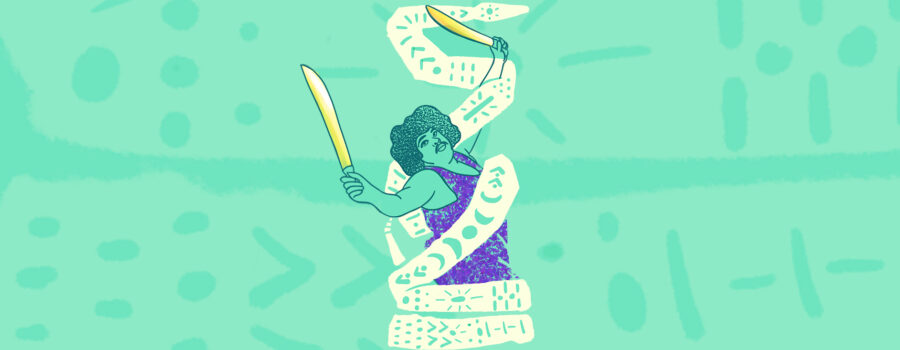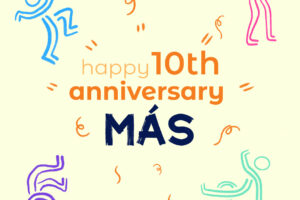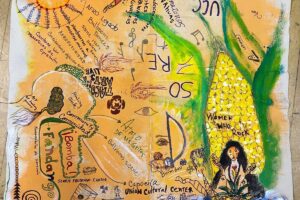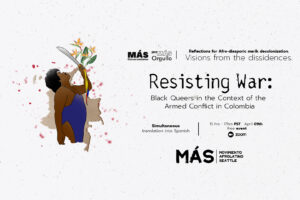Johan Mijail does not introduce herself: she bursts in. Her mere presence, her voice, her gesture, and her words are manifestations of a living art that transcends genres and categories. Writer, performer, Afro-Caribbean transvestite born in Villa Mella, Dominican Republic, Johan has woven herself from a vital urgency: to leave evidence of her passage through this plane, not from a place of fear, but from creation, power and ancestral mystery.
“I was not born a transvestite,” she says, and with that she dismantles the entire normative apparatus that tries to fix bodies within binary coordinates. For Johan, transvestism is not an identity, it is an expansive practice, a poetic, bodily and political technology of reinvention. Her journey wasn’t linear or easy. From discomfort in traditional gay spaces to the disconnection with the hegemonic narratives of white, cis feminism, her body has been a battlefield, a living archive, a contested and constantly evolving territory.
Her art crosses every kind of geographical, symbolic and gendered border. Since migrating to Chile, Johan has confronted the structural racism of the Southern Cone, but also uncovered new forms of affection, desire, and struggle. She writes from wounds, yes, but also from pleasures. In Pordioseros del Caribe, Inflamadas de retórica and Manifiesto antiracista, she documents and denounces, but also sows new languages. Johan does not write for luxury, she writes out of necessity: “I am a proletarian of language,” she declares. In her performances, the body emerges as the main medium of a political aesthetic that disturbs, unsettles, and reveals. Naked in museums and streets, she embodies a transgressive force that refuses to be domesticated. “Transvestism is not putting on a wig,” she warns, “it is intervening in a culture that wants you out.”
But Johan does not stop at denunciation or trauma aesthetics. Her project Metresas is proof of her affective, political and anti-colonial pedagogy. Workshops and fanzines where she systematizes her experience to share it as a memory, as a guide, as a tool. A space where Black, Afro-Indigenous, transvestite, queer and racialized dissidences can re-write (themselves), heal and imagine themselves “One does not become a transvestite to stay self-absorbed; through transvestism one expands”.
Through an intensely embodied writing, Johan has broken with the linearity of history, academic language, and static categories. Her references–from Josefina Baez to Valeria Flores–are part of an artivist, migrant, transvestite, and dissident constellation. With each word, each gesture and each appearance, Johan constructs and deconstructs herself . She carries a mystery that does not seek to be understood, but felt.
You can’t interview Johan, you listen to her like an orisha. She speaks from the abyss, from the mud, from the celebration and the wound. Her work does not fit in a museum, it can’t be summed up in a book, and won’t stay quiet in a racist country. Johan Mijail is, above all, a living proof that another way of existing–travesti, Black, intense, radical–is not only possible, but urgent.
Writing and performance: technologies of the impossible
“I began to use writing and performance as ways to investigate that obsession. Migration was a turning point: in Chile, I realized that homosexuality was not only a sexual practice, it was also a political, molecular dimension, as Deleuze and Guattari would say.
There, for example, my ex-partner told me: “I want to cook for you”. That affectionate gesture destabilized me. Here, in the DR, gay masculinity was lived through secrecy and denial of affection. There I understood that there could also be tenderness in our bonds.”
Living as a work: Johan Mijail and the obsession to build oneself out of the script.
“I was not born a transvestite.
I am becoming.
I am coming undone.
And that is my work.”
The conversation with Johan Mijail reached its most intense and vulnerable point when we talked about her life as an ongoing artistic project, a journey that traverses the body, writing, performance and politics. It is not just a biography; it is an embodied manifesto.
Tell us about your life as a piece that you are constantly creating. A kind of obsession to build yourself as other. How does it all start?
The first thing I have to say is that I was not born a transvestite. Transvestism, as I understand it and live it today, is an autobiographical, political, and aesthetic construction that does not fit within the binary identity narratives. I am not a woman, I am not a man, nor did I feel comfortable in gay spaces.
Calling myself as a transvestite is the result of an affective, corporal, migrant, artistic, and deeply racialized journey. It is something I do with the body, with the word, with the image and with silence.
How has the third edition of the Metresas workshop and the fanzine been for you? Who made it possible, and how have those connections come about?
It has been powerful. The chance to use the MÁS platform has been key, because it has allowed me to bring this knowledge and experience to other Black and Afro-descendant people. Although the project is not explicitly posed as Afro-centered, it has an anti-colonial and anti-racist stance that directly impacts these bodies.
But it is not easy. This was the hardest group, and I had to present the workshop while sick. So I asked myself: Do they really care about what I have to to say? Do they care about who I am, beyond what I produce? That is the constant question: what place does my life have in this–not just my work?
Race, desire and stereotypes
“Being a person of African descent in spaces of sexual dissidence puts you in a specific position: racialized desire, the body as fetish, porn as script.
I didn’t fit the imaginary of the Black fag with a big penis. Once a fellow transvestite told me without a filter: “They hate you here because you don’t fit that stereotype”. So I asked myself, who can be wanted? Who can be free?”
You have said that the experiences of trans, Black, migrant and dissident people are often delegitimized even within progressive spaces. How has this been for you?
It is constant. They invite us to speak, but don’t pay us. We are not legitimized. A trans, queer, Black transvestite from Villa Mella is not taken seriously.
If a cishet academic comes, they put him up at the Hilton, they pay him in euros? Nothing. Sometimes they just want us to be there to fill a diversity quota, but there is no awareness of what real recognition means in our lives.
I have published books, I have exhibited work, I have been in many spaces… and still, the value of what I have to say is questioned all the time. That hurts. And yet MÁS has been an exception. They have recognized me, accompanied me and allowed me to support myself.
So how do we build healthy and sustainable relationships between artists, their art, and their allies?
First, I think we devote too much of ourselves to people we don’t even know, and we forget about our daily, intimate alliances. We want to transform the world, but we don’t transform ourselves or care for those close to us..
I have found more healing in my relationship with my Black mother than with many activists who say we are sisters. Not everyone in the Black world is my sister. There are people who have silenced me, excluded me, because my existence disrupts their comfortable narratives. For me, this possibility of more than an alliance has been extremely powerful, it is a radical bond.
Usually, we have to engage to people who have power, but are white or white-mestizo, and those people don’t want to see. With MÁS it’s different. There is recognition, there is real dialogue. They have allowed me to use their platform to connect with other Black and Afro-descendant people, and that alone is a political act. That is why I say: safe spaces are not declared. They are built from affection, conflict, and coherence.
Will there be a fourth version of the Metresas workshop and fanzine with MÁS?
Hopefully. But it also has to change the way we sustain it. We cannot repeat the same thing without hurting ourselves. I want it to have other forms, not to become monotonous. That we continue to break with what is expected of us.
But, above all, I want those who care to be cared for. So that we understand that our lives are worth more than the content we produce. That would be the real change.
Metresas is not just a workshop or a fanzine. It is a strategy of life, a rebellion and a memory. Thank you, Johan, for lighting the spaces… and for teaching us how to keep the fire alive. .

















